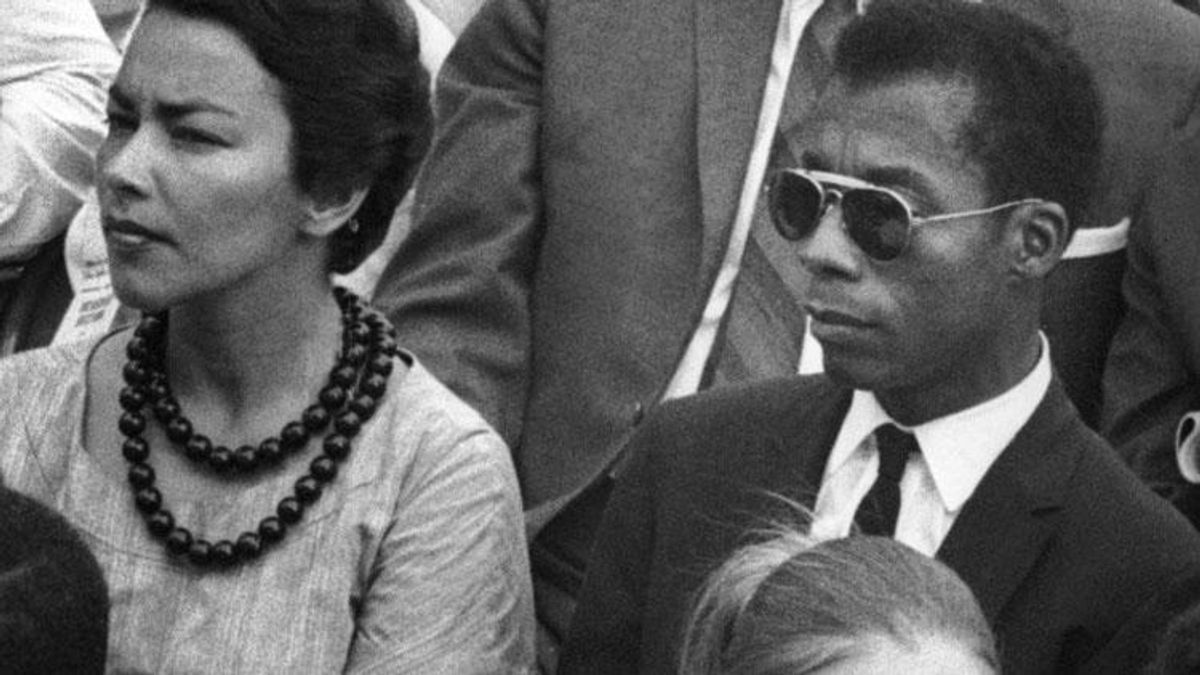In a scene in Stagecoach -- a 1939 Western starring John Wayne -- Wayne's cowboy character is pursued by a group of Native Americans on horseback. He shoots round after round at the pursuers, a sight that was thrilling to watch for a young James Baldwin. When he became older, this thrill gave way to terror.
You are rooting for John Wayne, he reflected, until you realize you are the Indian.
This reel, paired with Baldwin's commentary, is but one of the many eye-opening moments in I Am Not Your Negro, a new Oscar-nominated documentary by Raoul Peck (Sometimes in April, Lumumba), which gives new voice to the late black author and activist. Although Baldwin died nearly three decades ago, his words startle in their truth and immediacy. When it comes to speaking about race in America, Baldwin could be writing about today. In many ways, the documentary shows that he is.
I Am Not Your Negro weaves together archival footage of Baldwin and the civil rights movement with modern-day scenes: the uprising in Ferguson, Mo., the portraits of Trayvon Martin, Tamir Rice, and other slain young men of color. The narration, by Samuel L. Jackson, is drawn from Baldwin's writings, including essays from Notes of a Native Son and an unfinished book, Remember This House, about the lives and assisanations of leaders of the movement: Martin Luther King Jr., Malcolm X, and Medgar Evers. In turn, the documentary shows the different methods of resistance and revolution employed by these leaders.
Many LGBT people will know Baldwin for his 1956 novel Giovanni's Room, which was groundbreaking in its portrait of same-sex love. However, the sexuality of Baldwin, who was gay, is addressed only once in the documentary, through an FBI memo that declared him a "known homosexual." But I Am Not Your Negro is not a biography. It is a lesson, and one that is desperately needed in a world still rattled by police violence, protests, and hate crimes. As Baldwin remarked, "History is not the past. It is the present."
History, how it gets written, and by whom is central to the documentary. Some of the most powerful moments occur in its juxtaposition of America's competing narratives, including those manufactured by Hollywood studios. A singing, wide-eyed Doris Day cuts to a blind Ray Charles and horrific scenes of lynching. The Statue of Liberty, captured in a 1960s promotional film produced by the U.S. government, segues to the Watts riots in Los Angeles. Through these joinings, the documentary forces the viewer to see the two faces of the American coin: liberty and tyranny, prosperity and violence, dream and reality.
"People who are denied the American dream will wreck it," Baldwin said, in one of many prescient warnings. He also countered the lies America has told itself about race, proclaiming "the West has no moral authority."
Today's America is no stranger to competing narratives. The world is divided between news and fake news, truth and alternative truth. Social media has shattered many of these divides, showing the world the everyday reality of violence and injustice like never before. Conversely, it has also cast doubt on these realities by allowing conspirators and their theories to deny atrocity, even after they are faced with it.
Donald Trump rode one of these narratives to the White House with the slogan "Make America Great Again." From a Baldwinian perspective, this signals a retreat into fantasy and ignorance, and a forceful oppression of those who resist. But this tactic, Baldwin argued decades ago, is no solution.
"This is a formula for a nation's or a kingdom's decline, for no kingdom can maintain itself by force alone," he stated. "Force does not work the ways its advocates seem to think it does. It does not, for example, reveal to the victim the strength of his adversary. On the contrary, it reveals the weakness, even the panic of his adversary, and this revelation invests the victim with patience. "
In an interview with Out magazine, the documentary's director, Raoul Peck, addressed the newfound urgency of Baldwin's words and wisdom, in a time when those in power are gaslighting the country with distractions and untruths.
"We can't just go on in this present vulgarity and ignorance, totally disoriented. Young people are really disoriented," Peck said. "At one time they don't have the classic training that we used to have at school. At the same time they're bombarded with permanent fake info, fake data, pseudo-knowledge. And the elders are not there anymore. Everything has the same value. So as a young person I always wonder how do you [navigate] that?"
Peck hopes Baldwin's words -- as well as the archival footage, which will show the truth of historical oppression to any who try denying it happened -- open eyes and ears, and will encourage others to speak out as well.
"I hope Baldwin will help," he said. "The conversation around Baldwin, the reappropriation of his work and his words -- because when you read it, you say, 'Wow, this guy was saying that in a time when it was dangerous.' And today we can't even open our mouths. What's the risk? And I hope people get that."
I Am Not Your Negro is now out in select theaters. Watch the trailer below.


















































































